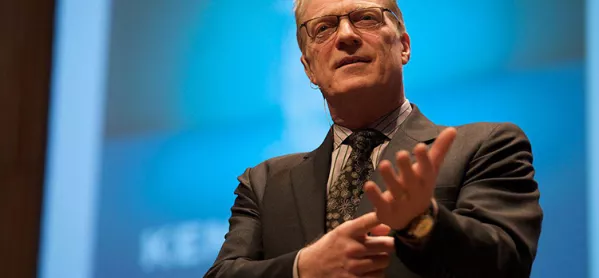- Home
- ‘Ken Robinson is a teacher-basher: schools must stop listening to his Panglossian ideas’
‘Ken Robinson is a teacher-basher: schools must stop listening to his Panglossian ideas’

At the “Power and Possibility of Individualised Learning” event held in Minneapolis recently, Sir Ken Robinson (pictured) reiterated the claim that children are naturally disposed to learn and that “it’s the construct of school” that beats a love to learn out of students. He went on to note that “the problems tend to arise when kids go to school because the deeper they get in, the more they start to lose interest”. Based on this talk, one journalist made the claim that “kids don’t fail, schools fail kids.”
At the heart of his argument is a canny bit of sophistry: it’s not schools and teachers that are to blame but rather it’s the system that’s to blame. The implication here is that teachers are either mindless automatons unable to think for themselves, fooled by an evil system into inadvertently beating a love of learning out of students, or we are complicit in the system forcing kids to guzzle down the neoliberal Kool Aid while laughing demonically as they struggle.
My experience of being a full-time teacher in various schools (something Sir Ken has never been, by the way) is that teachers are not beating a love of learning out of students but are working themselves to near-exhaustion to furnish kids with the kinds of knowledge and skills that will allow them to not just pass exams but also to flourish as human beings.
Despite this, working teachers are constantly bashed by “experts” who have little experience of being a teacher or school leader themselves and who deal in the nebulous rather than the specific, exhorting “creativity”, “inspiration” or something “21st-century” without actually giving any concrete alternatives.
‘Unwarranted criticism’
For too long now, teachers have been given answers to questions they didn’t ask, solutions to problems that didn’t exist - and all packaged under the crude inference that we are simply doing it all wrong. It is difficult to think of another profession that has been dictated to as much as education, and, depressingly, it’s difficult to think of another profession that has uncritically embraced this often unwarranted criticism as much as we have.
Robinson says that children lose interest the deeper they get into school. I can relate to this, because when I was 14 I pretty much lost interest in school, but it had nothing to do with school and everything to do with the fact that I was 14. As Rob Coe reminds us, learning happens when children have to “think hard” and this is anathema to most teenagers. Robinson wants to see kids being given more freedom and choice to do things that are more closely aligned with their own interests. Well, the more freedom and choice I had in school, the less I wanted to do things that would ultimately give me more freedom and choice later on in my life. As an avid reader, I didn’t want to study Shakespeare at school but wanted to read science fiction and contemporary poetry. It took me a university degree in English to realise that my understanding of contemporary culture would be spectacularly enriched by studying Shakespeare, not diminished by it.
This idea that everything has to be “relevant” to children is a debased view of the profession. The notion that children can only learn things through the prism of their own interests and that to ask them to consider things outside of that is somehow beating a love of learning out of them is demeaning, not just to teachers but to students themselves. Possibly the greatest thing a teacher can do is to introduce students to wondrous worlds beyond the limited borders of their own experience, to allow them to see the previously unseen and to make new and enriching connections that were hitherto unavailable to them.
A lot of the truly meaningful work that happens in schools is never seen by the gurus and thought leaders who gather at conferences and speak of “paradigm shifts”. In fact, it has nothing to do with timetables, exams or structural features but rather it happens in the interstitial moments of our day: the break time we give up to talk to a troubled child, the after-school clubs, the trips, the difficult calls home to parents and the heart-bursting pride we feel when we see a student achieve more than they ever thought possible.
Yes, the system is not perfect, but how could it be? We have many disastrous examples from the past of Panglossian idealism that has actually let students down rather than enfranchising them, and where is this supposed apocalypse that he speaks of? Standards of living in the West have never been better and much of this is down to our education system, which teachers and school leaders should feel proud - not ashamed of.
Carl Hendrick is head of learning and research at Wellington College. He tweets as @c_hendrick
Want to keep up with the latest education news and opinion? Follow Tes on Twitter and like Tes on Facebook
Register with Tes and you can read two free articles every month plus you'll have access to our range of award-winning newsletters.
Keep reading with our special offer!
You’ve reached your limit of free articles this month.
- Unlimited access to all Tes magazine content
- Save your favourite articles and gift them to your colleagues
- Exclusive subscriber-only stories
- Over 200,000 archived articles
- Unlimited access to all Tes magazine content
- Save your favourite articles and gift them to your colleagues
- Exclusive subscriber-only stories
- Over 200,000 archived articles